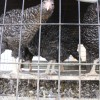 Animal manures have been used as natural crop fertilizers for centuries. Because of poultry manure’s high nitrogen content, it has long been recognized as one of the most desirable manures. Besides fertilizing crops, manures also supply other essential plant nutrients and serve as a soil amendment by adding organic matter, which helps improve the soil’s moisture and nutrient retention. Organic matter persistence will vary with temperature, drainage, rainfall, and other environmental factors. This 2-page fact sheet was written by Michael A. Davis, D.R. Sloan, Gerald Kidder, and R.D. Jacobs, and published by the UF Department of Animal Science, November 2013.
Animal manures have been used as natural crop fertilizers for centuries. Because of poultry manure’s high nitrogen content, it has long been recognized as one of the most desirable manures. Besides fertilizing crops, manures also supply other essential plant nutrients and serve as a soil amendment by adding organic matter, which helps improve the soil’s moisture and nutrient retention. Organic matter persistence will vary with temperature, drainage, rainfall, and other environmental factors. This 2-page fact sheet was written by Michael A. Davis, D.R. Sloan, Gerald Kidder, and R.D. Jacobs, and published by the UF Department of Animal Science, November 2013.
http://edis.ifas.ufl.edu/aa205
Tag: Manure as Fertilizer
FSHN10-02/FS150 Food Safety on the Farm: Good Agricultural Practices and Good Handling Practices—Manure and Municipal Biosolids
FSHN10-02, a 4-page fact sheet by Keith R. Schneider, Renée Goodrich-Schneider, and Alexandra Chang, is part of the Food Safety on the Farm series. It focuses on GAPs and GHPs relating specifically to manure and municipal biosolids. Includes references. Published by the UF Department of Food Science and Human Nutrition, May 2010.
http://edis.ifas.ufl.edu/fs150
SL293/SS506 Using Composted Poultry Manure (Litter) in Mulched Vegetable Production
SL-293, a 9-page illustrated fact sheet by George Hochmuth, Robert Hochmuth, and Rao Mylavarapu, answers vegetable producers’ questions about what poultry manure and litter are, what plant nutrients they contain, considerations for using them, results of research in Florida, how to use it in a mulched-bed system, and how to collect and submit for testing poultry manure samples. Includes references. Published by the UF Department of Soil and Water Science, October 2009.
http://edis.ifas.ufl.edu/SS506